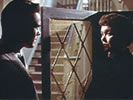Eye For Film >> Movies >> All That Heaven Allows (1955) Film Review
Taboos are like rules. They may be there for good reasons. Or not. Like rules, they need to be broken when a higher principle holds.
Sirk tackles the stifling taboos of social convention. Unlike art house filmmakers, he hides his serious message (and serious filmmaking) within mainstream formats. It is no wonder he can count modern directors such as Tarantino among his admirers.

All That Heaven Allows swells with sensuous, expressionistic pools of colour. Meticulous, highly embellished mise-en-scene. Simplified dialogue, tear-jerker characters. But most of all it plays to both the mainstream element it vilifies and the libertarian whose philosophy it upholds.
Cary (Jane Wyman) is an attractive widow. Like middle-aged Stepford Wives, her local community decrees that her position suits her for nothing more than sexless union with a nice elderly gentleman. Or life in front of a television set. But Cary falls passionately in love with a young gardener.
Rock Hudson is the strong silent male. But when he has something to say, it is worth saying. He has found contentment in a wholesome, simple life. His life with nature, growing and pruning trees, has become internalised.
This would sound the stuff of whimsy were it not backed up with sincerity, great acting and the fact that Ron Kirby (Hudson) has become a believable role model for his best mate. Through Kirby, the film becomes a paean to the American dream of self-determination that many Americans have never learnt how to aspire to. A Dream submerged by capitalism, social mores or religious values. The stifled dream becomes a melancholy lament. A dramatisation of women’s sexuality. A dilemma from which there is no escape.
But Sirk does realise mainstream audiences (and no doubt his sponsors) will not like such a message. So he makes the gossiping community not only realistic but sympathetic. Cary’s blackmailing children are adorable – who could not side with them? And isn’t a woman’s place to put her children and the community first (even if they don’t give that much of a damn)?
Serious filmgoers may not find the ending, which relies too much on coincidence, believable. But as Sirk himself once pointed out, you’re not meant to. It’s tacked on. A final irony. The story as society would have us live it. The unrealisable, incomplete, substitute. The opiate promoted through our television sets.
Douglas Sirk work was only recognised critically when he abandoned America, unable to adapt to its lifestyle. He was at the height of his commercial success. Championed by Godard and Cahiers du Cinema, and then in the Seventies by English-speaking critics, his importance gradually dawned. Todd Haynes’ tribute, Far From Heaven, reawakened both the style and structure of All That Heaven Allows and possibly led to wider acknowledgement of Sirk’s great contribution to cinema. Yet Sirk’s balancing act is a hard act to follow, even if the visual technique can be copied. In The Hours, we saw the tradition-fettered American woman of that same period, but that woman gained our respect through a superhuman decision. Sirk’s heroines are merely human.
Sirk was a man ahead of his time who ultimately only found true solace in teaching. The children in All That Heaven Allows are not ‘a new generation’ but learn only how to perpetuate tradition and repression. Sirk’s legacy, in films such as this, yearns for a new generation of understanding. In this, it is far more than just one of the great American films of the Fifties.
Reviewed on: 31 Jan 2008


















